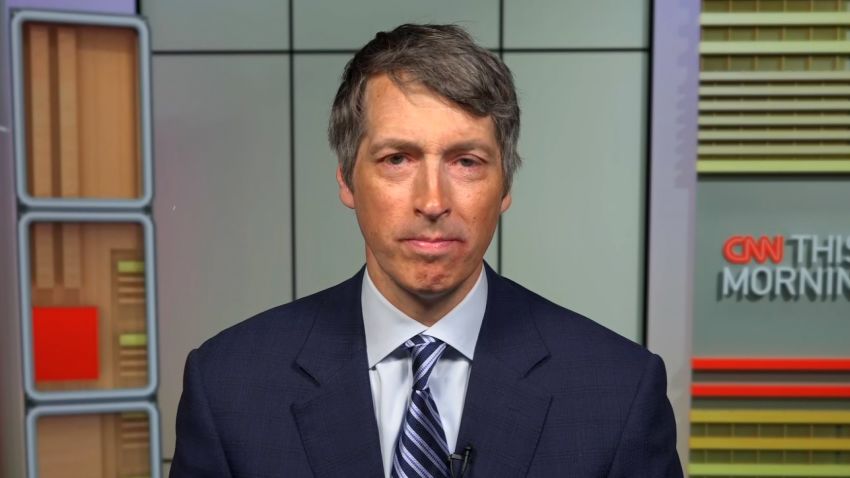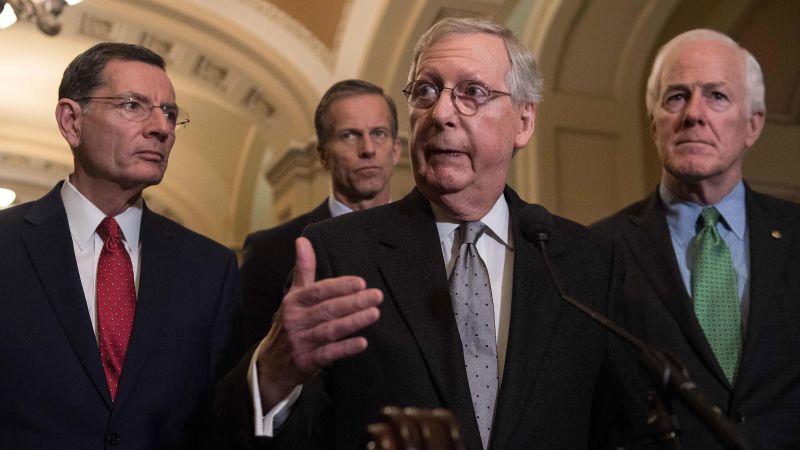It would be a mistake to presuppose these are the final days of Sen. Mitch McConnell’s record-setting run as the Republican leader in the Senate.
But his recent public freezing spells make it imprudent not to consider what comes next. Each member of the acknowledged possible short list of replacements has been on the receiving end of former President Donald Trump’s insults. And yet, who Republican senators choose could mean either elevating someone vocally at odds with the former president or someone who has tried very hard not to criticize Trump.
The conservative publication National Review, which three years ago bestowed the title “Master of the Senate” on McConnell, today is calling for Republicans to begin the process of replacing him.
McConnell is among the more controlled and calculating lawmakers in US history, and after his repeated inability to answer questions during portions of news conferences, the National Review editors suggested calculation and prudence are required now.
“This gives us no pleasure to say this,” National Review’s editor-in-chief Rich Lowry said on “CNN This Morning” on Friday. “I think he’s one of the most effective – the most effective and consequential – Senate leader in memory.”
CNN’s Manu Raju reported McConnell has been moving behind the scenes to reassure his colleagues, even providing a doctor’s note from the Capitol physician that says McConnell is fit for duty.
But there is also, according to Raju, “initial chatter” among some Republicans about trying to force a special conference meeting to consider McConnell’s future as their leader.
Raju writes: “Even if they have a meeting, there’s no mechanism to force a vote on the party’s leadership. That wouldn’t happen until after the 2024 elections. But such a meeting would draw more focus on McConnell’s health.”
Read Raju’s full report.
Most people actively in government today probably can’t actually remember the time before McConnell was the Republican leader. He took over in 2007, when Republicans lost the Senate majority.
He was Senate majority leader when the GOP held a majority between 2015 and 2021. He easily kept his post in his party despite Republicans losing control in the 2020 election and failing to reclaim it in the 2022 midterms.
It’s an era that saw Republicans veer from the national security focus of George W. Bush to focus on Trump’s personality in recent years.
Lowry said McConnell does not necessarily need to step aside immediately.
But …
“He needs to make the decision that it’s time to step aside and then set the wheels in motion. … He probably has shrewd thoughts about how actually to carry this out,” Lowry said.
McConnell appeared to freeze during a press conference for the second time this year. He has been medically cleared to continue his schedule, according to the US Capitol physician. ” data-duration=”01:39″ data-source-html=’ – Source:
CNN
‘ data-fave-thumbnails='{“big”: { “uri”: “https://media.cnn.com/api/v1/images/stellar/prod/230901084901-rich-lowry.jpg?c=16×9&q=h_540,w_960,c_fill” }, “small”: { “uri”: “https://media.cnn.com/api/v1/images/stellar/prod/230901084901-rich-lowry.jpg?c=16×9&q=h_540,w_960,c_fill” } }’ data-vr-video=”” data-show-html=”” data-check-event-based-preview=”” data-network-id=”” data-details=”” readability=”5.8461538461538″>

‘Time to put the wheels in motion’: Rich Lowry calls for McConnell to step down
There are already informed guesses at potential McConnell replacements comprised mostly of his current and former lieutenants.
The New York Times surmised Thursday that the short list would be made up of the “Three Johns” – Sen. John Thune of South Dakota, Sen. John Cornyn of Texas and Sen. John Barrasso of Wyoming.
There are plenty of ways to evaluate these senators, who have all been in the Senate for more than 15 years and cast thousands of votes.
But in today’s GOP, it’s their attitude toward Trump that might be among the most important. They represent a sliding scale of acceptance toward Trump today.
Thune, the No. 2 Republican in the Senate, made his name by ousting Democrats’ then-leader Sen. Tom Daschle in 2004.
Thune has at times wanted to move on from the Senate. He privately considered not running for reelection in 2022, according to reports at the time, citing family obligations, but also a frustration at the more Trumpy direction the party appeared to be taking.
Trump has previously lashed out at Thune for not being sufficiently Republican – “RINO,” or Republican in name only, is a favorite insult for Trump to hurl at colleagues. And in January 2021, Trump encouraged South Dakota Gov. Kristi Noem to challenge Thune in the 2022 Republican Senate primary. She declined.
Thune, in turn, endorsed Sen. Tim Scott of South Carolina to be the Republican presidential nominee in 2024. Scott’s campaign has not yet taken off in the polls, but Thune has been clear that he thinks if Trump is on the ballot, Republicans will do poorly.
Before Thune was the Republican whip, Cornyn held that job. The Texan has been similarly opposed to a third chance for Trump to be the Republicans’ nominee, although he did get Trump’s endorsement for his 2020 reelection.
“He’s got a unique ability to rally his base, but not to grow beyond his base, which is a problem,” Cornyn said of Trump in May.
More recently, Trump lashed out at Cornyn as “the Stiff” in a post on his Truth Social platform in late July, and equated Cornyn with Utah’s Sen. Mitt Romney, a longtime Trump foe.
Barrasso, an orthopedic surgeon before his political career, currently serves as conference chair, No. 3 in the Senate GOP leadership. Up for reelection in 2024, Barrasso has been more careful not to alienate Trump.
But in Trump’s mind, Barrasso is guilty by association with McConnell. In January, Trump referred to Barrasso as McConnell’s “flunky” during a radio interview in Barrasso’s home state of Wyoming.
No Senate leader will be able to maintain a flawless relationship with Trump, but McConnell’s has been particularly fraught. McConnell was outright critical of Trump after the January 6, 2021, insurrection, although he stopped short of voting to convict Trump on impeachment charges and said accountability for Trump should come through the court system.
McConnell’s wife, Elaine Chao, who served in Trump’s administration as transportation secretary, has more recently been the subject of racial insults from Trump.
However, McConnell realized the opportunity of Trump’s presidency perhaps more than most. He worked with Trump when it served the purpose of a policy goal like putting conservatives on the Supreme Court or enacting a massive tax cut bill.
Any successor would have to navigate Trump’s control of the party – and the very real potential that Trump could return to the White House.








